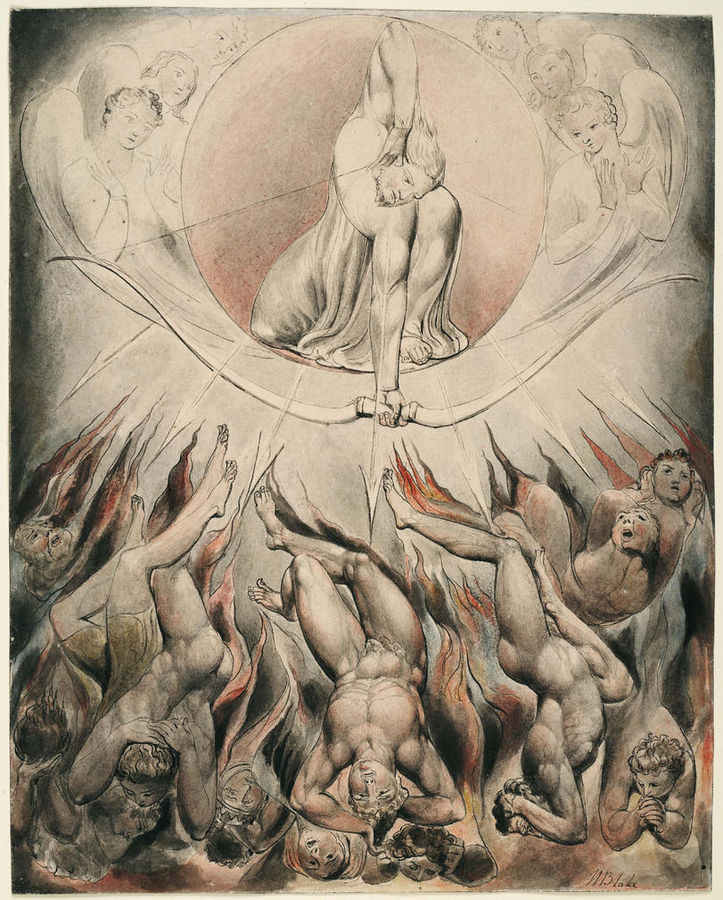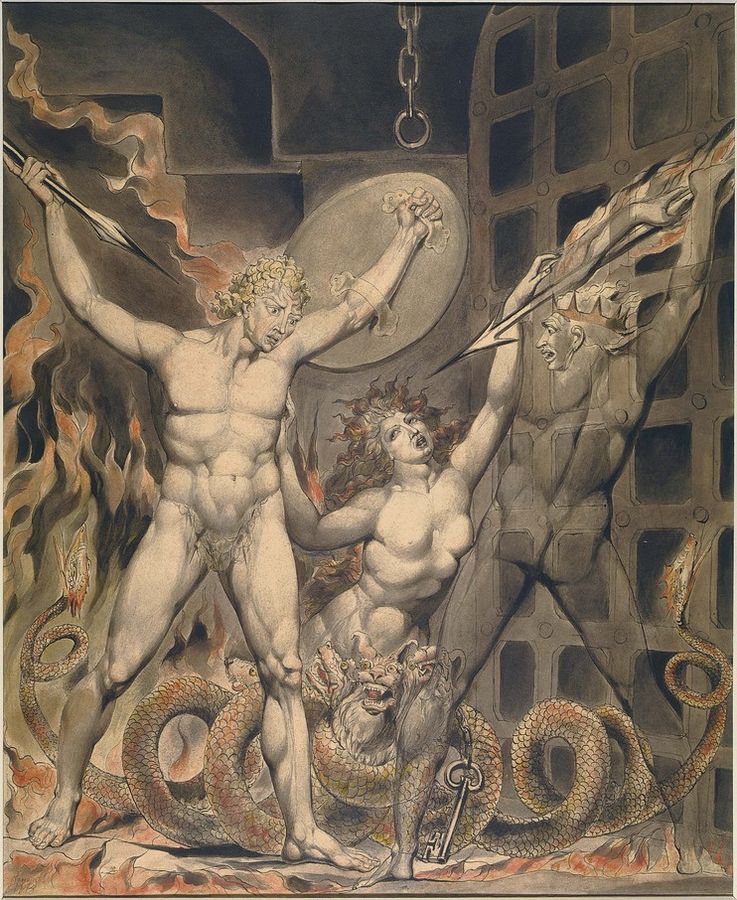The Judgment of Adam and Eve
From Book 10
from his radiant Seat he rose
Of high collateral glorie: him Thrones and Powers,
Princedoms, and Dominations ministrant
Accompanied to Heaven Gate, from whence
Eden and all the Coast in prospect lay.
90Down he descended strait; the speed of Gods
Time counts not, though with swiftest minutes wing'd.
Now was the Sun in Western cadence low
From Noon, and gentle Aires due at thir hour
To fan the Earth now wak'd, and usher in
95The Eevning coole, when he from wrauth more coole
Came the mild Judge and Intercessor both
To sentence Man: the voice of God they heard
Now walking in the Garden, by soft windes
Brought to thir Ears, while day declin'd, they heard,
100And from his presence hid themselves among
The thickest Trees, both Man and Wife, till God
Approaching, thus to Adam call'd aloud.
Where art thou Adam, wont with joy to meet
My coming seen far off? I miss thee here,
105Not pleas'd, thus entertaind with solitude,
Where obvious dutie erewhile appear'd unsaught:
Or come I less conspicuous, or what change
Absents thee, or what chance detains? Come forth.
He came, and with him Eve, more loth, though first
110To offend, discount'nanc't both, and discompos'd;
Love was not in thir looks, either to God
Or to each other, but apparent guilt,
And shame, and perturbation, and despaire,
Anger, and obstinacie, and hate, and guile.
115Whence Adam faultring long, thus answer'd brief.
I heard thee in the Garden, and of thy voice
Affraid, being naked, hid my self. To whom
The gracious Judge without revile repli'd.
My voice thou oft hast heard, and hast not fear'd,
120But still rejoyc't, how is it now become
So dreadful to thee? that thou art naked, who
Hath told thee? hast thou eaten of the Tree
Whereof I gave thee charge thou shouldst not eat?
To whom thus Adam sore beset repli'd.
125O Heav'n! in evil strait this day I stand
Before my Judge, either to undergoe
My self the total Crime, or to accuse
My other self, the partner of my life;
Whose failing, while her Faith to me remaines,
Of high collateral glorie: him Thrones and Powers,
Princedoms, and Dominations ministrant
Accompanied to Heaven Gate, from whence
Eden and all the Coast in prospect lay.
90Down he descended strait; the speed of Gods
Time counts not, though with swiftest minutes wing'd.
Now was the Sun in Western cadence low
From Noon, and gentle Aires due at thir hour
To fan the Earth now wak'd, and usher in
95The Eevning coole, when he from wrauth more coole
Came the mild Judge and Intercessor both
To sentence Man: the voice of God they heard
Now walking in the Garden, by soft windes
Brought to thir Ears, while day declin'd, they heard,
100And from his presence hid themselves among
The thickest Trees, both Man and Wife, till God
Approaching, thus to Adam call'd aloud.
Where art thou Adam, wont with joy to meet
My coming seen far off? I miss thee here,
105Not pleas'd, thus entertaind with solitude,
Where obvious dutie erewhile appear'd unsaught:
Or come I less conspicuous, or what change
Absents thee, or what chance detains? Come forth.
He came, and with him Eve, more loth, though first
110To offend, discount'nanc't both, and discompos'd;
Love was not in thir looks, either to God
Or to each other, but apparent guilt,
And shame, and perturbation, and despaire,
Anger, and obstinacie, and hate, and guile.
115Whence Adam faultring long, thus answer'd brief.
I heard thee in the Garden, and of thy voice
Affraid, being naked, hid my self. To whom
The gracious Judge without revile repli'd.
My voice thou oft hast heard, and hast not fear'd,
120But still rejoyc't, how is it now become
So dreadful to thee? that thou art naked, who
Hath told thee? hast thou eaten of the Tree
Whereof I gave thee charge thou shouldst not eat?
To whom thus Adam sore beset repli'd.
125O Heav'n! in evil strait this day I stand
Before my Judge, either to undergoe
My self the total Crime, or to accuse
My other self, the partner of my life;
Whose failing, while her Faith to me remaines,
175Because thou hast done this, thou art accurst
Above all Cattle, each Beast of the Field;
Upon thy Belly groveling thou shalt goe,
And dust shalt eat all the dayes of thy Life.
Between Thee and the Woman I will put
180Enmitie, and between thine and her Seed;
Her Seed shall bruise thy head, thou bruise his heel.
The Judge spoke to the Serpent
So spake this Oracle, then verifi'd
When Jesus son of Mary second Eve,
Saw Satan fall like Lightning down from Heav'n,
Above all Cattle, each Beast of the Field;
Upon thy Belly groveling thou shalt goe,
And dust shalt eat all the dayes of thy Life.
Between Thee and the Woman I will put
180Enmitie, and between thine and her Seed;
Her Seed shall bruise thy head, thou bruise his heel.
The Judge spoke to the Serpent
So spake this Oracle, then verifi'd
When Jesus son of Mary second Eve,
Saw Satan fall like Lightning down from Heav'n,
The figures at the top of the image are Sin and Death; they have found the Gates of Hell, enabled by the Fall of Adam and Ev.
For another picture Sin and Death are in combat. (Look at Paradise Lost 2)
The central figure is of course a forgiving Christ standing between a penitent Adam and a shame faced Eve.
As the Bible story goes, after they had sinned, they were ashamed of their nakedness and found nothing but fig leaves for clothing; the snake slithered on a foundation of fig leaves and all the others stood on it.
This idea of the judgment and intercession settles the question (for Blake) of a God of Wrath (OT) and a God of Forgiveness and Mercy (NT)









